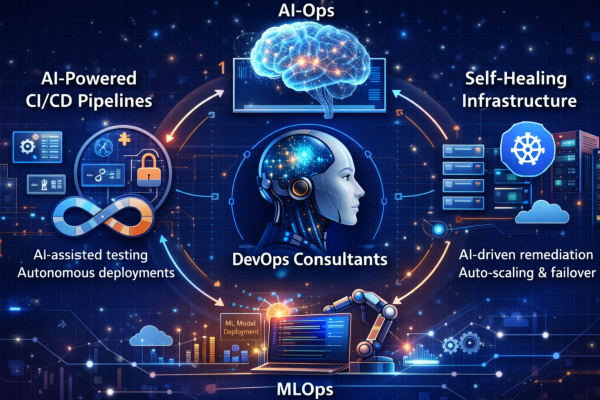How Do DevOps Services Support Cloud Computing?
The rapid adoption of cloud computing has transformed how businesses operate, allowing for scalable, flexible, and cost-effective solutions. However, to fully harness the power of cloud computing, organizations need a robust framework that ensures smooth operations, continuous delivery, and seamless integration. This is where DevOps services come into play. By combining development and operations,
DevOps creates a collaborative culture that breaks down silos, speeds up processes, and enhances overall productivity. In this blog, we will explore how DevOps services support cloud computing, focusing on the integration of these two powerful paradigms to achieve optimal business outcomes. If you’re looking for ways to improve your cloud infrastructure, engaging with professional DevOps Consulting Services In Mohali is a strategic choice.
Understanding DevOps and Cloud Computing
DevOps is a methodology that merges software development (Dev) and IT operations (Ops) into a unified process. Its primary goal is to accelerate the software development lifecycle, enabling faster delivery of features, fixes, and updates while ensuring they are closely aligned with business objectives. DevOps promotes a culture of collaboration between the development and operations teams, automating processes to enhance the efficiency and reliability of software delivery.
Cloud computing, on the other hand, refers to delivering computing services—servers, storage, databases, networking, software, analytics, and intelligence—over the internet (“the cloud”). These services enable faster innovation, flexible resources, and economies of scale. Companies can rent access to computing services instead of owning and maintaining physical data centers, leading to significant cost savings and operational efficiency.
How DevOps Enhances Cloud Computing
DevOps services and cloud computing complement each other in several ways. Let’s dive into the key areas where DevOps supports cloud computing:
1. Automated Provisioning and Deployment
Cloud computing relies heavily on the rapid provisioning and deployment of resources. DevOps practices such as Infrastructure as Code (IaC) allow for automated management of cloud environments. Tools like Terraform and AWS CloudFormation enable teams to define infrastructure through code, ensuring consistent and repeatable deployment across environments.
Automated provisioning eliminates the need for manual configuration, reducing errors and speeding up the deployment process. This alignment with cloud environments allows businesses to scale up or down quickly based on demand, thereby optimizing resource utilization and reducing costs. Leveraging DevOps Consulting Services can ensure that your organization implements these practices effectively, optimizing your cloud infrastructure.
2. Continuous Integration and Continuous Delivery (CI/CD)
One of the core principles of DevOps is the implementation of CI/CD pipelines. Continuous Integration (CI) involves the automated testing and integration of code changes into the main codebase, while Continuous Delivery (CD) ensures that these changes are automatically deployed to production environments. In cloud computing, CI/CD pipelines streamline the software development process, enabling faster releases with fewer errors.
By integrating CI/CD pipelines with cloud platforms, organizations can automatically build, test, and deploy applications in a seamless manner. This not only accelerates the development cycle but also ensures that applications are always in a deployable state. DevOps Consulting Services can help design and implement robust CI/CD pipelines that align with your cloud strategy, ensuring high-quality and reliable software delivery.
3. Scalability and Flexibility
Cloud computing offers unmatched scalability and flexibility, allowing businesses to adjust their resource allocation based on current needs. DevOps practices enhance these capabilities by enabling automated scaling and resource management. For example, container orchestration tools like Kubernetes can automatically scale applications based on traffic, ensuring optimal performance without manual intervention.
By integrating DevOps with cloud platforms, organizations can achieve dynamic scaling, where resources are automatically adjusted based on predefined rules. This ensures that applications can handle varying workloads without downtime, providing a seamless user experience. Engaging with DevOps Consulting Services can help you implement these practices, ensuring that your cloud infrastructure is both scalable and resilient.
4. Monitoring and Logging
Effective monitoring and logging are crucial for maintaining the health and performance of cloud-based applications. DevOps services emphasize the importance of continuous monitoring and proactive alerting to identify and resolve issues before they impact users. Tools like Prometheus, Grafana, and ELK Stack (Elasticsearch, Logstash, Kibana) are commonly used to monitor cloud environments and provide actionable insights.
In cloud computing, where environments are highly dynamic and distributed, monitoring and logging become even more critical. DevOps practices ensure that logs and metrics are collected, analyzed, and acted upon in real-time, enabling teams to maintain high availability and performance. DevOps Consulting Services can guide your organization in setting up comprehensive monitoring and logging systems, ensuring that your cloud infrastructure remains robust and secure.
5. Security and Compliance
Ensuring security is paramount for any organization utilizing cloud services. DevOps practices integrate security into every stage of the software development life cycle, a concept known as DevSecOps. By incorporating security measures into the CI/CD pipeline, organizations can identify and mitigate vulnerabilities early in the development process.
DevOps also supports compliance with industry regulations by automating security checks and ensuring that infrastructure adheres to best practices. For example, using tools like AWS Config or Azure Policy, organizations can enforce security policies across their cloud environments. DevOps Consulting Services can help you implement a DevSecOps strategy that enhances your cloud security posture while ensuring compliance with relevant standards.
6. Cost Optimization
A major advantage of cloud computing is its cost efficiency. Without effective management, cloud expenses can rapidly escalate beyond control. DevOps services play a vital role in optimizing cloud costs by automating resource management, right-sizing instances, and implementing policies for efficient resource utilization.
For example, auto-scaling and load balancing can be configured to match resource allocation with actual demand, ensuring that you only pay for what you use. Additionally, DevOps practices like continuous monitoring and automated alerts can help identify and eliminate unused or underutilized resources. Engaging with DevOps Consulting Services can provide your organization with the expertise needed to implement cost-saving strategies in your cloud environment.
Best Practices for Integrating DevOps with Cloud Computing
To fully realize the benefits of integrating DevOps services with cloud computing, organizations should follow certain best practices:
1. Adopt a Collaborative Culture
DevOps is equally focused on fostering a collaborative culture as it is on utilizing tools and processes. Encourage collaboration between development, operations, and security teams to break down silos and improve communication. A collaborative culture ensures that everyone is aligned towards the common goal of delivering high-quality software efficiently.
2. Embrace Automation
Automation is at the heart of DevOps and cloud computing. Automate as many processes as possible, from provisioning and deployment to monitoring and security. Automation minimizes human error, accelerates workflows, and guarantees consistency across different environments.
3. Implement Continuous Feedback Loops
Continuous feedback is essential for improving processes and delivering better outcomes. Use monitoring tools and user feedback to gain insights into the performance of your applications and infrastructure. Regularly review and iterate on your processes to ensure continuous improvement.
4. Focus on Security from the Start
Security should not be an afterthought. Implement DevSecOps practices to integrate security into every stage of the development lifecycle. Use automated security testing and compliance checks to identify and address vulnerabilities early.
5. Leverage the Right Tools
Choosing the right tools is crucial for the successful integration of DevOps and cloud computing. Evaluate tools based on your organization’s specific needs, whether it’s for CI/CD, monitoring, security, or cost management. DevOps Consulting Services can help you select and implement the right tools for your cloud environment.
Conclusion
The synergy between DevOps services and cloud computing is undeniable. By integrating DevOps practices with cloud platforms, organizations can achieve faster time-to-market, enhanced scalability, improved security, and optimized costs. Whether you’re just starting your cloud journey or looking to optimize your existing infrastructure, DevOps Consulting Services can provide the expertise and guidance needed to unlock the full potential of cloud computing. Embrace the power of DevOps and cloud computing to drive innovation and stay ahead in today’s competitive landscape.
Author







